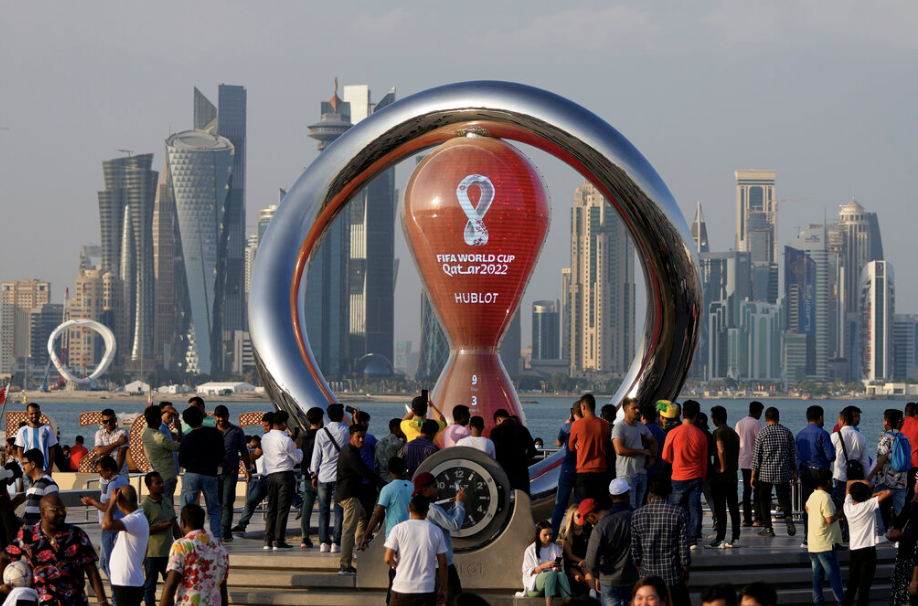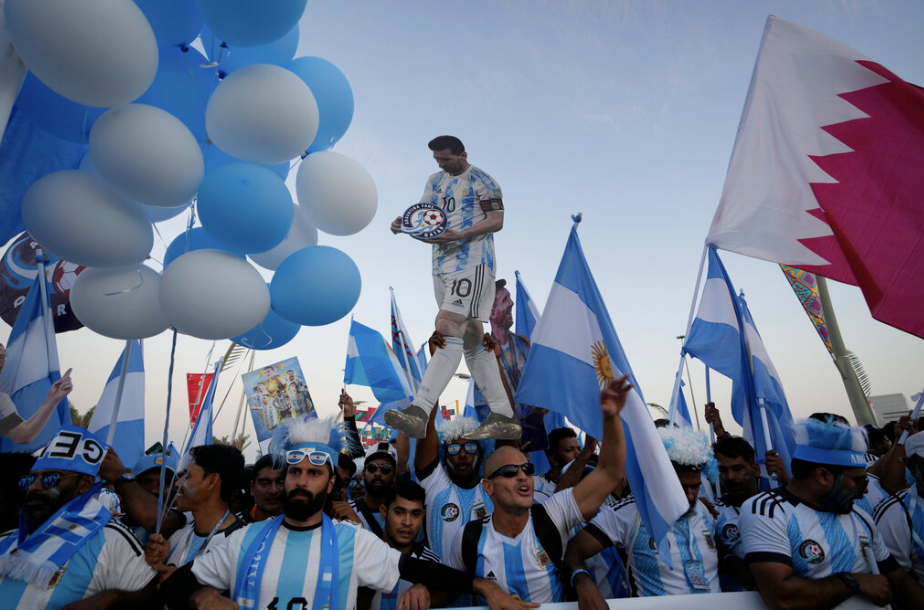Qatar Hosting World Cup Highlights “Sportswashing” Trend in the Middle East
People awaiting the 2022 World Cup in Doha, Qatar on Nov. 11, 2022. Photo: (AP Photo/Hassan Ammar)
The 2022 FIFA World Cup begins on Nov. 20 in the small Arab nation of Qatar. The country is expected to spend over $220 billion to host the tournament, despite expectations of a mere $20 billion in economic benefits for Qatar. This World Cup tournament will be the most expensive to host by far, with the 2014 Brazil World Cup and 2018 Russia World Cup coming in second and third, costing roughly $15 billion and $11.6 billion, respectively.
Qatar’s bid to host the World Cup is quite evidently not about increasing economic activity in the country, given the astronomical disparity between the overall cost and the expected economic boost the tournament will bring. The motive undeniably is to sportswash, a term referring to the tendency of governments to invest in international sporting events to divert attention from their poor human rights records.
Qatar, a country that has faced serious accusations of human rights abuses, stands to benefit from sanitizing its image on the global stage. 95 percent of the small Middle Eastern petroleum state's workforce are guest labor migrants from some of the poorest countries in Africa and Asia. The migrant force of 2 million workers is critical for Qatar’s economy and its ability to develop the necessary infrastructure to host the World Cup this year. A multitude of alleged human rights violations regarding Qatar’s treatment of its migrant workforce exists, including thousands of worker deaths due to lackluster safety regulations, failure to pay the workers their salaries, racial discrimination, and even accusations of slavery.
Qatar’s poor treatment of the LGBT community, oppression of women, and crackdowns on free speech further suggest why diverting the global community’s attention away from Qatar’s domestic reality is in the country’s best interest.
Despite the controversy, FIFA has followed through with the tournament. Many teams and their fan bases from around the world have already arrived in Qatar and are ready to compete for the 2022 World Cup title.
Argentina fans cheer for star player Lionel Messi as they await the FIFA World Cup tournament in Doha, Qatar on Nov. 11, 2022 (AP Photo/Hassan Ammar)
Although hosting the World Cup, likely the world’s most prestigious sporting event, is perhaps the most overt example of sportswashing to date, Qatar is far from the only Persian Gulf state to participate in the practice.
Saudi Arabia, the largest and most powerful Gulf State, is no stranger to sportswashing as well. The Saudi government has hosted numerous sporting events, such as golf tournaments, wrestling matches, boxing matches, and motorsport races. Saudi Arabia has recently set up the LIV Golf Tour to rival the Professional Golfers’ Association (PGA) by buying off many of the PGA’s top golfers. Saudi officials have even made attempts to infiltrate Major League Baseball (MLB) and the National Basketball Association (NBA) in the United States by attending meetings and business calls with league commissioners. Saudi Arabia’s war crimes in Yemen, its poor treatment of women, and the murder of Washington Post journalist Jamal Khashoggi are a few of the many aspects of Saudi government policies that the kingdom has attempted to distract the international community from.
Other Persian Gulf nations like Bahrain and the United Arab Emirates (UAE) invest heavily in sportswashing as well. Qatar, Saudi Arabia, Bahrain, and the UAE are all notorious human rights abusers with relatively similar forms of government and interpretations of Islamic law. Sportswashing has proven to be an effective region-wide strategy, as most Persian Gulf countries enjoy generous investments from international governments and access to global oil markets despite the authoritarian and far-right nature of their governments.


